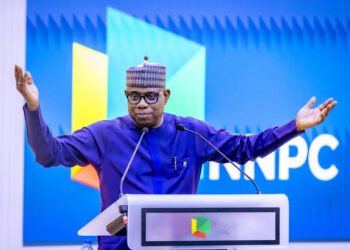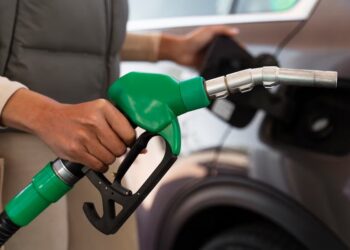The Nigerian National Petroleum Corporation (NNPC), has promised to support ongoing initiatives by the Federal Ministry of Petroleum Resources, to provide an alternate energy source to Nigerians, through aggressive activation of Compressed Natural Gas (CNG) refill stations, for motorists across the country.
According to a press statement issued by the Group General Manager, Group Public Affairs Division of NNPC, Dr.Kennie Obateru; the Group Managing Director of the Corporation, Mallam Mele Kyari, speaking on TVC Business show, affirmed that the NNPC has already keyed into the gas penetration agenda, championed by the Minister of State for Petroleum Resources, Chief Timipre Sylva.
READ: These companies are partnering to take advantage of Nigeria’s flared gas
“As an energy company with a focus on cleaner and cheaper sources of fuel, the Corporation would continue to work with other stakeholders in the industry to provide viable alternatives to petrol, which would ultimately lead to a reduction in demand for the product and eventual reduction in price,” said Kyari
While reiterating the commitment of the oil giant towards openness and greater transparency in its operations, the NNPC GMD, noted that, in the coming months, NNPC would publicly release its 2019 Audited Financial Statements, as a sequel to the 2018 AFS released in June.
Kyari also shed more light on the status of the nation’s refineries, noting that the plants were deliberately shut down, to allow for a robust diagnosis of the issues which have overtime made it impossible for the facilities to operate at the expected capacity.
READ: World Bank hopes to cut down debts of poor countries rather than delay payments
In addition, he also disclosed that, the shutdown of these state-owned refineries was inevitable, due to difficulties in feeding them with crude oil, through the pipelines that have been completely compromised by vandals.
He said the corporation was moving rapidly to execute complete rehabilitation of the refineries, under an exercise that would guarantee restoration of the facilities, to at least 90% capacity utilization.
Nairametrics had earlier reported, that the Federal Government said Nigerians, with effect from next month, can now convert their cars, that use petrol to gas – a cheaper alternative.
READ: NNPC takes legal action against Mexican firm over $125 million ‘attempted fraud’
“To give deregulation a human face, the Federal Government is introducing an alternative fuel,” said Timipre Sylva, “if you go to a filling station, and you cannot convert your car to dual capability (dual fuel), then you can drive into a typical filling station where you will find gas, that is LPG, CNG, and NLG.”






















